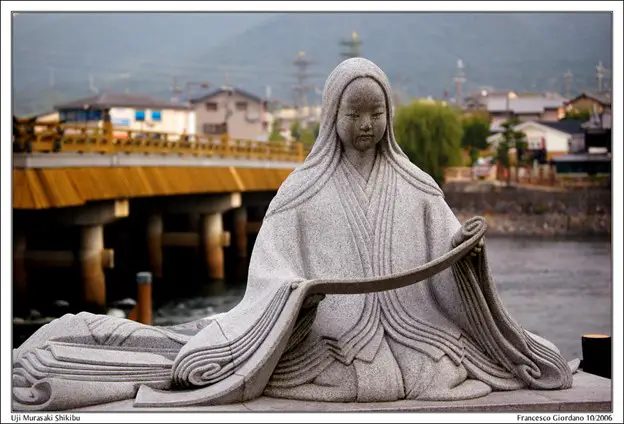The novel is the most popular and well-regarded form of written storytelling. Its origins point to England in the 19th century. The work of authors such as Charles Dickens and Jane Austen were a major influence on the genre. But, what many consider to be the world’s first novel is much older, and it is from a non-Western culture.
The world’s first novel is said to be The Tale of Genji, which a noblewoman Murasaki Shikibu wrote in the early 11th century. The long, complex novel tells the story of a handsome and talented young Prince Genji, who navigates the intricate social and political landscape of Japan’s Imperial court.
But who wrote this work of Japanese literature – The Tale of Genji.
Murasaki Shikibu is thought to have written The Tale of Genji between 1001 and 1005 CE. During that time, she began serving as a lady-in-waiting at Japan’s Imperial Court. Little is known about her life, including her real name, other than a few details.
We know she was born into a noble family called Fujiwara. And based on studying the novel, we can presume she was well-educated in the arts, literature, and classical Chinese. An unusual thing for Japanese women at the time.
What Is The Tale of Genji About?

The world’s first novel centres on Hikaru Genji, the son of a Heian Period emperor. At the start, Genji’s mother dies after giving birth to him.
Despite Genji being the emperor’s son, his father strips him of his right of succession, because of complexities in Japanese politics.
Genji becomes a commoner and an Imperial officer.
Chapters 1-44
The first section of the book follows Genji’s various love affairs, leading to his exile from court for sleeping with the wife of a rival.

When he returns, Genji rises through the ranks reaching high officialdom. Soon after, his young wife commits adultery. Then the woman he truly loves dies, causing him to abandon the capital and die alone in depression.
Chapters 45-54
The latter part of the book focuses on Genji’s grandson, Kaoru, and his friend, Niou-no-miya. Both of them go through a series of affairs, eventually courting the same woman, Ukibune.
Why Is The Tale of Genji Important?
In some ways, the world’s first novel is a long soap opera—a succession of love affairs and melodramatic turns. So, why do scholars consider it to be one of the greatest works of Japanese literature?
It has Complex Characters
One of the major reasons is its complexity, on many levels. The novel, especially for its time, is notable for its intricate and subtle portrayal of characters and its nuanced depiction of relationships. The characters are layered and three-dimensional, with emotions that still resonate today.

Seeing the Japanese Imperial Court through their eyes provides us with a remarkable window into the history and politics of the period.
Descriptions of The Natural World
The Tale of Genji is also notable for its evocative descriptions of the natural world. The setting and mood of the piece are as important as its plot. The poetry is exquisite, as the author weaves characters through the dialogue, while they exchange poems about nature.
The Legacy of The Tale of Genji
Despite its status as the world’s first novel, The Tale of Genji remains a work of niche interest. It hasn’t been widely read outside Japan. But, within the country, it remains highly revered and is studied in schools and universities.
Translations
The story has been translated into many languages, in both partial and complete forms. The complete English translations are by Arthur Waley, Edward G. Seidensticker, Royall Tyler, and Dennis Washburn.
Adaptations
Many adaptations of the novel include films, such as Kōzaburō Yoshimura’s in 1951 and Yasuo Tsuruhashi’s in 2011. It was animated twice, in 1987 and 2009, and Genji also inspired two mangas (comic books and graphic novels originally produced and published in Japan), stage plays, and an opera in 2000 by Miki Minoru.
In Summary
The Tale of Genji is an important and influential work of literature. It paved the way for the development of the novel as a literary form. Its sophisticated and nuanced portrayal of characters and relationships, as well as its evocative descriptions of the natural world, make it a timeless and enduring work that continues to be appreciated and studied by readers around the world.
Related Posts
Sources
The Heart of History: The Tale of Genji – Sonja Arntzen – Winter 2005
Britannica: Murasaki Shikibu – Amy Tikannen

